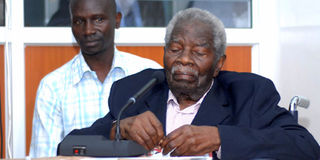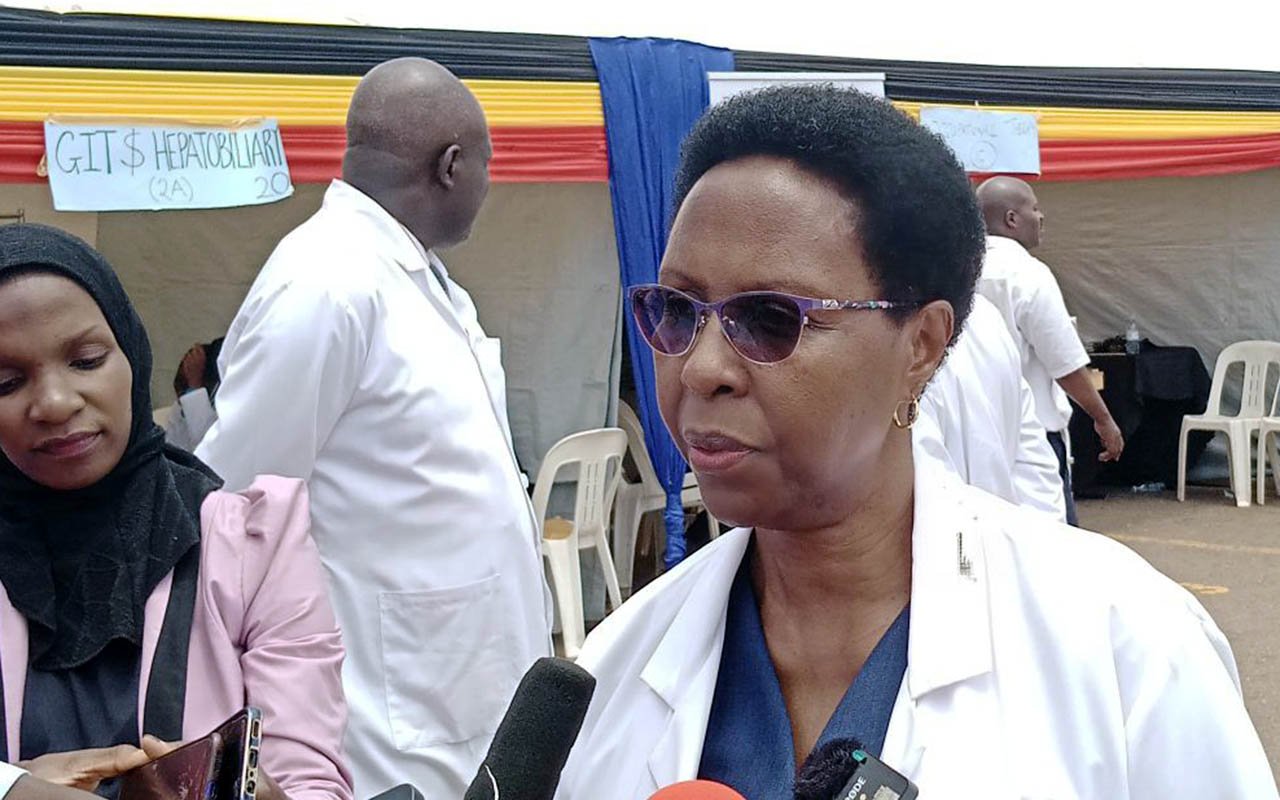Uganda’s pioneer Health minister Dr Lumu leaves a lasting legacy

Fare-thee-well. The late Emmanuel Bujingo Sajjalyabane Lumu (right) appears before the Land probe in May. PHOTO BY RACHEL MABALA
What you need to know:
- Opportunity. Despite joining Makerere University College where he was enrolled at the medical school against his will, Dr Emmanuel Bijjugo Sajjalyabene Lumu did his best, which later opened doors for him, writes Henry Lubega.
- In 1962, Dr Lumu as representative of Kyadondo, was one of the 21 delegates Mengo sent to Parliament under the UPC-KY alliance arrangement.
While in Parliament, he was appointed minister of health in the first Cabinet of independent Uganda.
The family was planning for a grand birthday party in February next year to celebrate his 104 birthday.
However, God had a different plan for the family of Uganda’s pioneer Health minister, Dr Emmanuel Bijjugo Sajjalyabene Lumu.
He breathed his last on Wednesday at his home in Bakuli suburb in Rubaga Division, Kampala.
Mrs Vivian Kityo said her late father despite old age appeared in good health.
“We were planning for his 104th birthday. However, as the weather changed, he got a bad cough. Despite efforts from different doctors, it worsened into pneumonia, which affected his breathing,” Ms Kityo said.
Dr Lumu will be laid to rest on Tuesday next week at 2pm in Kiwenda after Namulonge, Wakiso District.
“We got a letter from the Prime Minister saying the government wants to offer him a state burial. There will be a funeral service on Monday at St Paul’s Cathedral Namirembe,” Ms Kityo told Daily Monitor yesterday.
Dr Lumu’s life
He was born in February 1916 in Komamboga, now Wakiso District.
Lumu was the sixth in a family of 10 children of Mr Mikaili Sajjalyabene and wife Hannah Nalwoga.
Dr Lumu started his education in Kyebando suburb before going to Mengo Junior School. He later joined King’s College, Budo in 1933.
In 1938, he joined Makerere University College where he was enrolled at the medical school against his will.
His preference was engineering, but medicine was forced onto him by the college administration.
His love for the engineering profession was so strong that he would stealthily attend engineering lectures until he was found out by the administration and reprimanded.
In 1945, he graduated with a Diploma in Medicine as an Assistant Medical Officer, although he had done six years required for a doctorate in medicine.
At that time, medical graduates from Makerere and other institutions in Africa under the British colonial administration, despite studying the same courses like their counterparts in Britain, were not referred to as doctors but as Assistant Medical Officers.
After two years of internship, Dr Lumu was posted to Arua Hospital, later to Gulu and finally Mulago hospital.
Ms Christine Ochwo Nyakatura was a nursing officer at Mulago hospital in the late 1950s when Dr Lumu joined the hospital’s medical staff.
She worked with Dr Lumu at the same hospital before he left for politics.
“We called him ‘Mr White’ because he always put on a white shirt and a white coat. He was a jolly man, not tribalistic (sectarian) and very knowledgeable. Dr Lumu was a nice man who knew his job very well and treated every one as an equal. When he became the Health Minister I was a nursing officer, he was a team player,” she says.
Ms Nyakatura adds: “It was him and the likes of Kadama and Ibanda who oversaw and ensured the opening of the 21 hospitals in different parts of the country. Dr Lumu and his team worked for the betterment of the health sector not only the medical professionals, but they had commitment to medical care.”
In the late 1950s, most educated Ugandans took interest in politics and Lumu was no exception.
He started his political career by subscribing to the Buganda Kingdom government at Mengo, where he was one of those who campaigned for the boycott of the 1961 elections.
Role to Uganda’s independence
During the first Lancaster Conference in 1961 that discussed the process of Uganda’s independence, he was part of the Buganda delegation to London.
Others in the delegation were the kingdom’s premier Michael Kintu, Leonard Bassude, A.D Lubowa, E.M.K Muwazi, A.K. Sempa, E.W. Kiggunddu, and Fred Mpanga.
In 1962, Dr Lumu as representative of Kyadondo was one of the 21 delegates Mengo sent to Parliament under the UPC-KY alliance arrangement.
While in Parliament, he was appointed minister of Health in the first Cabinet of independent Uganda.
Lumu was one of the two surviving ministers in the first Cabinet. His death leaves only Mathias Ngobi as surviving minister of the first Obote government.
The arrest
During a Cabinet meeting at State House in Entebbe on February 22, 1966, five ministers; E.B.S. Lumu, George Magezi, Baraki Kirya, Mathias Ngobi and Grace Ibingira were arrested.
They were taken to Entebbe Magistrate’s Court and charged with conducting themselves in a manner dangerous to peace and good order in the country, inciting enmity between the people of Uganda and the government and intriguing against the power and authority of the Uganda government.
They were taken to Patiko Prison in Gulu. They appealed to the High Court which ordered their release on grounds that the former ministers had been arrested without valid warrants of arrest.
They were brought back to Entebbe court and released.
However, their freedom was short-lived. They were rearrested within the court premises shortly after their release and detained under the emergency law, which had been introduced in Buganda region.
Dr Lumu and his colleagues were sent to Luzira Prison where they stayed until 1971 when Obote was toppled in a military coup by Idi Amin, who then declared an amnesty to all political prisoners.
Life after prison and politics
Upon release from prison, Dr Lumu did not go back into politics. He returned to his professional career.
Ms Kityo recalls the time her father returned home from jail in 1971.
“When my father came out of Luzira, I recall I was still young but I remember him saying how he hated politics and did not want anything to do with politics ever again. He was a very truthful man. He realised that politics was not a straight game. Actually, at one time, Obote commented that my father didn’t know politics because politics is not about telling the truth,” Ms Kityo says.
“He went back to surgery. He opened up a clinic in Mengo Kisenyi, called Dr Lumu’s surgery, which he ran until 1996 when he was 80 years old when retired from medical practice,” she adds.
Venturing into engineering
Besides having been denied a chance to study engineering, it did not kill his love for it. When he retired from medical practice, he revived his love for car mechanics.
“My father always wanted to do something and not to just sit down. He started buying old cars that were being auctioned. He opened up a garage near his home and repaired the cars before selling them off,” Ms Kityo says.
“The mechanics proved untrustworthy and he decided to leave the business as well and retire. At home he was an ardent newspaper reader until his eyes could not allow him. He was a hardworking man. That is how my father wants to be remembered,” she adds.
The daughter says due to Dr Lumu’s dedication to work he was hardly at home and his children missed his love.
“He literaly had no time for us as his children because he was always a busy man, either with politics or his profession. Despite that he made sure he bought us everything we wanted. It was our mother who was always there for us. As children we never had much quality time with our father,” Ms Kityo says.
In politics
In 1962, Dr Lumu as representative of Kyadondo, was one of the 21 delegates Mengo sent to Parliament under the UPC-KY alliance arrangement.
While in Parliament, he was appointed minister of health in the first Cabinet of independent Uganda.




